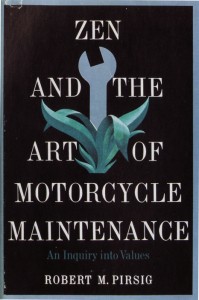 Robert Pirsig has made a handful of appearances here since the blog’s creation. Jennifer Ratner-Rosenhagen got things started when she presented a paper on Robert Pirsig and his famous book, Zen and the Art of Motorcycle Maintenance, at the 2010 S-USIH conference (two-thirds down the program page). That presentation inspired two USIH posts that directly invoked Pirsig. First Ben Alpers gave some thought
Robert Pirsig has made a handful of appearances here since the blog’s creation. Jennifer Ratner-Rosenhagen got things started when she presented a paper on Robert Pirsig and his famous book, Zen and the Art of Motorcycle Maintenance, at the 2010 S-USIH conference (two-thirds down the program page). That presentation inspired two USIH posts that directly invoked Pirsig. First Ben Alpers gave some thought
to how Pirsig’s book could, or should, be considered a part of any history of the so-called “New Age” Movement. Ben has since mentioned Pirsig a couple more times, in passing, in other posts. Next Andrew Hartman began with Pirsig to speculate about what a book on the intellectual history of the 1970s might look like.
Today—in the 40th anniversary year of the book’s publication—I’m going to take our level of engagement with Pirsig to a new level, one that I hope adds something substantial to Jennifer’s prior work. Not only has she let me read her 2010 conference paper, but Jennifer has also graciously allowed me to cite and quote from it in the piece below. What follows is yet another section that was cut from my book. When I wrote this section my intent was to (a) provide yet another instance of the prominence of the great books idea, even in 1970s when that idea was in a brief decline, and (b) show how “the Chicago great books group” (i.e. Adler’s community of discourse), for better or for worse, provided the best-known iteration of the idea (i.e. great books liberalism).
————————————————————————
In Robert Pirsig’s Zen and the Art of Motorcycle Maintenance one finds, on a first superficial pass, a great deal of mocking in relation to the great books and, seemingly anyway, Mortimer J. Adler. The great books idea and its so-called “great conversation” had become sacralized and ossified in Pirsig’s eyes. He argued that the Chicago-based version of the great books idea promoted an impossible rationalism, as well as many false dichotomies. But, beyond the scorn, Pirsig also offers a potential solution to the problem of the great books’ place, or role, in an American culture that might promote authenticity and wholeness. In other words, Pirsig was less opposed to the great books idea itself than the iteration he perceived was taught and promoted at the idea’s ground zero, the University of Chicago.
Pirsig (right) called his now famous tome a “culture-bearing book.” It was, one might say, a philosophical-autobiographical novel. The subtitle—“An Inquiry into Values
“—telegraphs the author’s larger ambitions. 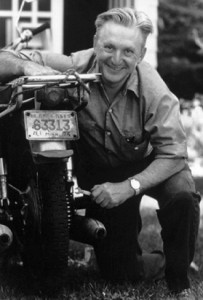 The book was eventually translated into twenty-three languages. It was regularly reviewed after its 1974 publication and sold five million copies worldwide. Given its popularity, it is worth noting that great authors, great ideas, and great books occupy a prominent place in the text. Indeed, the book’s infamous “Chairman for the Committee on Analysis of Ideas and Study of Methods” was identified by Jennifer Ratner-Rosenhagen as a “thinly-veiled” representation of Adler’s old colleague at the University of Chicago, Richard “Dick” McKeon (1900-1985, picture below). This representation derives from the fact that Pirsig himself was a student at the University of Chicago in the early 1950s. McKeon, a neo-Aristotelian philosopher, taught at Chicago from 1934 to until retirement in 1974. McKeon—appointed by Robert Hutchins but only a peripheral member of Adler’s community of discourse—was deeply devoted to the Western philosophical tradition, if not the great books idea in particular.[1] In Pirsig’s text McKeon becomes a mythical stand-in defender of the “great ideas” and “great conversation” of Western civilization. McKeon functions as Aristotle personified for Pirsig.
The book was eventually translated into twenty-three languages. It was regularly reviewed after its 1974 publication and sold five million copies worldwide. Given its popularity, it is worth noting that great authors, great ideas, and great books occupy a prominent place in the text. Indeed, the book’s infamous “Chairman for the Committee on Analysis of Ideas and Study of Methods” was identified by Jennifer Ratner-Rosenhagen as a “thinly-veiled” representation of Adler’s old colleague at the University of Chicago, Richard “Dick” McKeon (1900-1985, picture below). This representation derives from the fact that Pirsig himself was a student at the University of Chicago in the early 1950s. McKeon, a neo-Aristotelian philosopher, taught at Chicago from 1934 to until retirement in 1974. McKeon—appointed by Robert Hutchins but only a peripheral member of Adler’s community of discourse—was deeply devoted to the Western philosophical tradition, if not the great books idea in particular.[1] In Pirsig’s text McKeon becomes a mythical stand-in defender of the “great ideas” and “great conversation” of Western civilization. McKeon functions as Aristotle personified for Pirsig.
In the “character” of Phaedrus, Pirsig’s encounters with the University of Chicago, McKeon (right), the great books, and Aristotle are relayed in the book’s last five chapters. 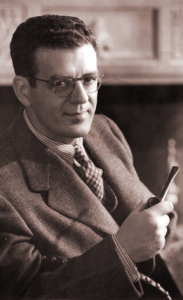 In those pages the book’s central problem also comes together for the protagonist. That problem, in the words Ratner-Rosenhagen, was a “quest to consider the relationship between value and truth,” as well as “to balance subjective experience with the prospect that quality (i.e. value) is objective.” It should be noted that “Phaedrus” is the name Pirsig’s father-figure narrator gives to memory fragments of his older self—a self separated from the narrator’s present by psychic trauma. Pirsig lays the foundation for Phaedrus’ discourse on quality and values by moving Phaedrus’ family to Chicago so that he can enroll at the University of Chicago, while also teaching at the University of Illinois’ Navy Pier campus (now UIC).[2]
In those pages the book’s central problem also comes together for the protagonist. That problem, in the words Ratner-Rosenhagen, was a “quest to consider the relationship between value and truth,” as well as “to balance subjective experience with the prospect that quality (i.e. value) is objective.” It should be noted that “Phaedrus” is the name Pirsig’s father-figure narrator gives to memory fragments of his older self—a self separated from the narrator’s present by psychic trauma. Pirsig lays the foundation for Phaedrus’ discourse on quality and values by moving Phaedrus’ family to Chicago so that he can enroll at the University of Chicago, while also teaching at the University of Illinois’ Navy Pier campus (now UIC).[2]
This move presents Phaedrus with an opportunity to recall the basic thrust of the Hutchins-era “reorganization of the University along Aristotelian lines.” In Pirsig’s eyes Adler was a central character in that reorganization:
[Adler] consistently harked back to St. Thomas Aquinas, who had taken Plato and Aristotle and made them part of his medieval synthesis of Greek philosophy and Christian faith. The work of Aquinas and of the Greeks, as interpreted by Aquinas, was to Adler the capstone of the Western intellectual heritage. Therefore they provided a measuring rod for anyone seeking the good books. [3]
With that last sentence Pirsig also confirms (or informs for some) the continued authority, in the mid-1970s, of the 1930s-era Chicago “Great Books group” in relation to the great books idea. The author-protagonist then proceeds to joust and fence with these “good books,” via McKeon but especially Aristotle, in several pages of excellent prose.[4]
As Pirsig saw it, the potential for danger—in that group and their ideas—came less from Aristotle than from the assumption of the Chicago “Great Books group” that the ancient classics should be read for their present value. Pirsig-Phaedrus knew how successful this “assumption” had become. Here is how Phaedrus’ proclaimed the problem:
The main struggle of the University’s Great Books program was against the modern belief that the classics had nothing of any real importance to say to a twentieth-century society. …Phædrus…didn’t just accept this idea. He passionately and fanatically knew it. He came to hate [the classics] vehemently, and to assail them with every kind of invective he could think of, not because they were irrelevant but for exactly the opposite reason. The more he studied, the more convinced he became that no one had yet told the damage to this world that had resulted from our unconscious acceptance of their thought.[5]
Although Pirsig focused on “the classics” and did not extend his hate toward modern great books, his reasoning could have applied to Enlightenment and post-Enlightenment works as well. For is it not true that the “unconscious acceptance” of modern thought can be just as dangerous? In any case, Pirsig-Phaedrus limited his terminology, in the text, in a way that might make one think that the more modernist ‘great books idea’ could be excluded from his vitriol.
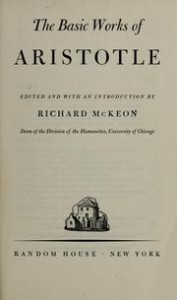 Pirsig-Phaedrus reserves special condemnation for the “Classic Greeks” due to a long-running internal feud in relation to what he called the “mythos over logos” argument. In this schema, “mythos” was the “early historic and prehistoric myths which preceded logos,” and “logos” was “the sum total of our rational understanding of the world.” In rejecting the “Classic Greeks” and a classics sensibility, Phaedrus embraced an understanding of the world based on mythos, to the point that he felt that those who had rejected the mythos were “insane.” In moving beyond Phaedrus’s past learning and views, the narrator (i.e. the mature Phaedrus/Pirsig), chooses to embrace “Quality” (or value) as larger and “outside” mythos—indeed, for Pirsig “quality is the generator of the mythos.” He added later: “Reason and Quality had become separated and in conflict with each other,” due to the Classic Greeks (and perpetuated by the Great Books group). Value and “quality had been forced under,” he continued, “and reason made supreme somewhere back then.” Pirsig related ‘quality’ to the Greek idea of aretê, or ‘excellence’. As an addendum, although Aristotle is important to Pirsig’s narrative by way of the Great Books group, in the end the narrator (not Phaedrus) finds Aristotle “dull” but not “evil.” Pirsig the narrator sees Aristotle’s thinking as an artifact, “primitive in the way old Greek pottery” feels to moderns. Pirsig conceded a lack of detailed knowledge about Aristotle, but nevertheless “can’t see that it lives up either to the raves of the Great Books group or the rages of Phaedrus.”[6] Aristotle was merely an interesting historical fragment—good foil for his philosophical novel.
Pirsig-Phaedrus reserves special condemnation for the “Classic Greeks” due to a long-running internal feud in relation to what he called the “mythos over logos” argument. In this schema, “mythos” was the “early historic and prehistoric myths which preceded logos,” and “logos” was “the sum total of our rational understanding of the world.” In rejecting the “Classic Greeks” and a classics sensibility, Phaedrus embraced an understanding of the world based on mythos, to the point that he felt that those who had rejected the mythos were “insane.” In moving beyond Phaedrus’s past learning and views, the narrator (i.e. the mature Phaedrus/Pirsig), chooses to embrace “Quality” (or value) as larger and “outside” mythos—indeed, for Pirsig “quality is the generator of the mythos.” He added later: “Reason and Quality had become separated and in conflict with each other,” due to the Classic Greeks (and perpetuated by the Great Books group). Value and “quality had been forced under,” he continued, “and reason made supreme somewhere back then.” Pirsig related ‘quality’ to the Greek idea of aretê, or ‘excellence’. As an addendum, although Aristotle is important to Pirsig’s narrative by way of the Great Books group, in the end the narrator (not Phaedrus) finds Aristotle “dull” but not “evil.” Pirsig the narrator sees Aristotle’s thinking as an artifact, “primitive in the way old Greek pottery” feels to moderns. Pirsig conceded a lack of detailed knowledge about Aristotle, but nevertheless “can’t see that it lives up either to the raves of the Great Books group or the rages of Phaedrus.”[6] Aristotle was merely an interesting historical fragment—good foil for his philosophical novel.
Having stated his case about the inadequacies of rationalist-Aristotelian philosophy, Pirsig then returned to the great books idea generally. He offered what would become an ironic, self-deprecating conclusion in relation to the future popularity of Zen and the Art of Motorcycle Maintenance—and the descending notoriety (in the mid-1970s) of the great books idea: “The raves of the Great Books group are well known and published. Phaedrus’ rages aren’t.” Pirsig reflected on great books in relation to Phaedrus’ ambitions and studies at the University of Chicago: “He had no time for or interest in other people’s Great Books. He was there solely to write a Great Book of his own. His attitude toward Aristotle as grossly unfair for the same reason Aristotle was unfair to his predecessors. They fouled up what he wanted to say.”[7] Does this, meaning Pirsig’s ambition to say something profound, not undercut the fairness of his evaluation the so-called “Great Books group”? Maybe.
But rather than losing oneself in potential interpretations of Pirsig’s attitude toward his education and his own writing desires, it is more productive to analyze what Pirsig’s Zen implied about Adler’s and his community’s visions for the great books idea. First, a clarification: while Adler was important to the “Great Books group,” he was neither an analogue for the Chairman (McKeon) nor the brash, unnamed “Professor of Philosophy” harshly portrayed in Pirsig’s book. Pirsig-Phaedrus acknowledges Adler’s absence at the time of the former’s enrollment, and that Adler and Hutchins were, in fact, concerned about “Quality” or values. But whether by accident or on purpose, the Professor of Philosophy represents a caricature of the “Great Books group” (maybe Leo Strauss?). The professor, furthermore, teaches a course that is literally a substitute, in the narrative, for a course run by the Chairman due a scheduling conflict. The weaknesses of this unnamed professor, as an instructor on Aristotle’s Rhetoric, become the weaknesses of the great books approach to liberal education. However, when the anonymous professor says “Sir, we are not here to learn what you think! …We are here to learn what Aristotle thinks!”—the wide cast of mid-century great books supporters at U of C make it easy for the reader to transfer negative reactions to Adler, Hutchins, and other great books promoters.[8]
Promoters aside, what of teaching methods and great authors beyond Aristotle and related classics? Pirsig’s readers are not told, for instance, that great books discussions, as promoted by the so-called Great Books group, were never meant to be lectures. They were supposed to be dialectical using large round tables—an aspect of great books discussion methodology dating to John Erskine in the 1920s. Indeed, a characteristic large round table makes an appearance in Pirsig’s text. It becomes a metaphor.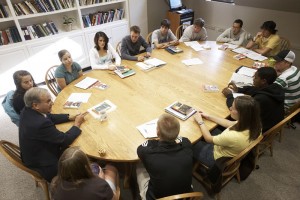 Based on Pirsig’s knowledge of the history of the “Great Books group,” it was no accident that the “enormous wood round table,” in the classroom where great books were taught, “had a huge crack that ran right across it near the middle.” The crack symbolized both Phaedrus’s preoccupation with the mythos-logos split, but also a problem with the faulty methodology propagated by the hectoring professor. Phaedrus-Pirsig continued: “It looked as though [the crack] had been there for years, but that no one had thought to repair it. Too busy, no doubt, with more important things.”[9] The sacralized great books idea, no longer fertile soil for great conversations (or “the great conversation”) about the great ideas, was now hardened, cracked ground—ossified beyond recognition. Even if Adler’s own devotion to Aristotle had not strictly betrayed the great books idea, in Pirsig’s narrative or elsewhere, the professor’s version was compromised nonetheless.
Based on Pirsig’s knowledge of the history of the “Great Books group,” it was no accident that the “enormous wood round table,” in the classroom where great books were taught, “had a huge crack that ran right across it near the middle.” The crack symbolized both Phaedrus’s preoccupation with the mythos-logos split, but also a problem with the faulty methodology propagated by the hectoring professor. Phaedrus-Pirsig continued: “It looked as though [the crack] had been there for years, but that no one had thought to repair it. Too busy, no doubt, with more important things.”[9] The sacralized great books idea, no longer fertile soil for great conversations (or “the great conversation”) about the great ideas, was now hardened, cracked ground—ossified beyond recognition. Even if Adler’s own devotion to Aristotle had not strictly betrayed the great books idea, in Pirsig’s narrative or elsewhere, the professor’s version was compromised nonetheless.
The crack—or Daniel Rodgers-esque fracture, if you will—in Phaedrus-Pirsig’s table is also an obvious metaphor the larger cultural and intellectual fragmentation of the 1960s, 1970s, and onward. In Pirsig’s view, “the Great Books” via the Chicago group represented what Bruce Schulman called stale “liberal universal” ideals, as well as the continuation of faulty rationalist dichotomies from ancient Greece (enumerated by Pirsig’s as one versus many, truth as relative or absolute, “ethical relativism” versus “pristine virtue,” mind versus matter, substance versus form, Plato’s notion of ideas versus appearance, etc.). The great books idea was a barrier to the integration of the self rather than a facilitator of wholeness. The crack in the table could be fixed, according to Pirsig, by resting in a notion from the Greek Sophists (or rhetoricians) called aretê. That was excellence, which could be called “Quality! Virtue! Dharma!” and be defined as “a respect for the wholeness or oneness of life.”[10] The East and West met, for Pirsig, in philosophically productive fashion with the Sophists. They were Pirsig’s chosen great books authors. With them, the fragmentation Western culture, as well as the advent of a postindustrial, disintegrated American postmodernist culture lacking in solidity, could be undone. They cultivated a respect for wholeness and life.[11] The great books idea and the Western tradition could get you there, but not, Pirsig asserted, if you stopped—as did Adler, Hutchins, and the rest of the Chicago Great Books group—with Aristotle or even Plato.
————————————————————————
Notes
[1] Robert Pirsig, Zen and the Art of Motorcycle Maintenance: An Inquiry into Values (New York: William and Morrow, 1974), 337, 342; Ronald L. DiSanto and Thomas J. Steele, Guidebook to Zen and the Art of Motorcycle Maintenance (New York: William and Morrow Co., 1990), 395; George Kimball Plochmann, Richard McKeon: A Study
(Chicago: University of Chicago Press, 1990), xi, 4-5, 9-10, 12, 18-22; Jennifer Ratner-Rosenhagen, “Philosophy Out of Doors: Thinking as Handicraft and Spiritual Practice in Robert Pirsig’s Zen and the Art of Motorcycle Maintenance” (Unpublished, 2010)., 5; Tim Andrew Obermiller, “Will the Real Richard McKeon Please Stand Up?,” University of Chicago Magazine (online), December 1994 (accessed 1/22/2012); Tim Adams, “The Interview: Robert Pirsig,” The Guardian, November 18, 2006.
[2] Pirsig, 347-348; Ratner-Rosenhagen, 3.
[3] Pirsig, 342.
[4] Pirsig, 334-335, 337-352, 359; Ratner-Rosenhagen, 5.
[5] Ibid., 347
[6] Ibid., 349-351, 358-359, 376.
[7] Ibid., 359, 363-364.
[8] Ibid., 343, 347-348.
[9] Ibid., 361. The table is mentioned again on p. 366.
[10] Bruce J. Schulman, The Seventies: The Great Shift in American Culture, Society, and Politics (Cambridge, MA: Da Capo Press, 2001), , 58; Pirsig, 367, 372-373, 376-379.
[11] J. David Hoeveler, The Postmodernist Turn: American Thought and Culture in the 1970s (New York: Twayne Publishers, 1996), 5-6.

2 Thoughts on this Post
S-USIH Comment Policy
We ask that those who participate in the discussions generated in the Comments section do so with the same decorum as they would in any other academic setting or context. Since the USIH bloggers write under our real names, we would prefer that our commenters also identify themselves by their real name. As our primary goal is to stimulate and engage in fruitful and productive discussion, ad hominem attacks (personal or professional), unnecessary insults, and/or mean-spiritedness have no place in the USIH Blog’s Comments section. Therefore, we reserve the right to remove any comments that contain any of the above and/or are not intended to further the discussion of the topic of the post. We welcome suggestions for corrections to any of our posts. As the official blog of the Society of US Intellectual History, we hope to foster a diverse community of scholars and readers who engage with one another in discussions of US intellectual history, broadly understood.
Very interesting post, Tim. A couple thoughts:
1) For a variety of reasons I don’t think the Professor of Philosophy is Strauss, both because Strauss was not a Professor of Philosophy and because the character doesn’t seem very Strauss-like to me;
2) I find the Chicago passages of Pirsig’s book far and away the most frustrating sections of it. Phaedrus sits around class silently imputing motivations on his professors and classmates. While his experience at Chicago feels to Phaedrus like a kind of conspiracy to trick him and to ignore Quality, the drama feels to me entirely like a projection on Phaedrus’s part. Of course Phaedrus is nearing a kind of psychotic break, so he might be forgiven. But the unwillingness of the Narrator to question what read to me like Phaedrus’s elaborate fantasies about his professors’ thoughts utterly aggravates me. And the whole thing appeals to the reader via a particular set of negative stereotypes of the academy.
In a sense, these negative stereotypes are crucial to Perisig’s self-presentation, because he wants to suggest that he, unlike academics, is willing to tackle the crucial question of Quality. The sections of the book that take place at the college in Montana at which Phaedrus taught also partake of these stereotypes. But at least there, the events that lead Phaedrus to question academia are real events that take place outside of his head.
Thanks Ben.
Of course my equation of “the philosopher” with Strauss was just speculation, no more, no less. I’m not sure that Pirsig ever carefully distinguished between philosopher or political philosopher, or even between mere core/gen edu instructors, so the speculation didn’t seem entirely specious.
On Pirsig imputing motivations, there’s some of that, as well as “recounting” of actual events from his “perspective”—which is always hazardous in terms of future historians’ analysis. And of course you’re totally right about this being near his psychic break.
You’re right that the book (or at least the parts in which I read) feels like a screed against thinking about, or studying, the humanities in the context of higher education. Of course Pirsig, the narrator, could counter that those impressions and perceptions were true to his person (i.e. Phaedrus) in the 1950s. Despite that caveat, there’s a reason that his 1950s-era personal search for meaning resonated in the mid-1970s—i.e. it correlated with 1960s student complaints about the academy being an instrumental place.
Then again, where in the academy was value/Quality/Virtue/Dharma(!) being discussed in the 1950s and 1960s? – TL